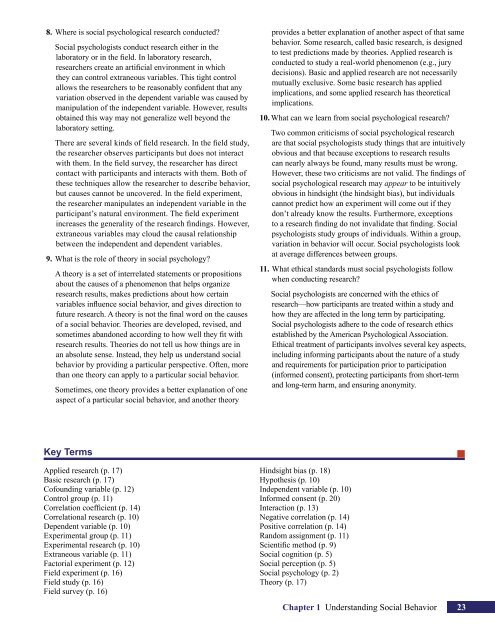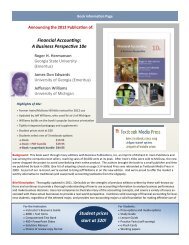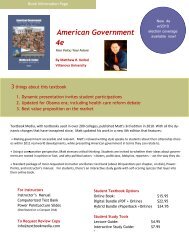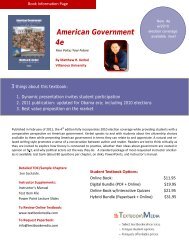Book Information / Sample Chapter(s) (PDF) - Textbook Media
Book Information / Sample Chapter(s) (PDF) - Textbook Media
Book Information / Sample Chapter(s) (PDF) - Textbook Media
- No tags were found...
You also want an ePaper? Increase the reach of your titles
YUMPU automatically turns print PDFs into web optimized ePapers that Google loves.
8. Where is social psychological research conducted?Social psychologists conduct research either in thelaboratory or in the field. In laboratory research,researchers create an artificial environment in whichthey can control extraneous variables. This tight controlallows the researchers to be reasonably confident that anyvariation observed in the dependent variable was caused bymanipulation of the independent variable. However, resultsobtained this way may not generalize well beyond thelaboratory setting.There are several kinds of field research. In the field study,the researcher observes participants but does not interactwith them. In the field survey, the researcher has directcontact with participants and interacts with them. Both ofthese techniques allow the researcher to describe behavior,but causes cannot be uncovered. In the field experiment,the researcher manipulates an independent variable in theparticipant’s natural environment. The field experimentincreases the generality of the research findings. However,extraneous variables may cloud the causal relationshipbetween the independent and dependent variables.9. What is the role of theory in social psychology?A theory is a set of interrelated statements or propositionsabout the causes of a phenomenon that helps organizeresearch results, makes predictions about how certainvariables influence social behavior, and gives direction tofuture research. A theory is not the final word on the causesof a social behavior. Theories are developed, revised, andsometimes abandoned according to how well they fit withresearch results. Theories do not tell us how things are inan absolute sense. Instead, they help us understand socialbehavior by providing a particular perspective. Often, morethan one theory can apply to a particular social behavior.Sometimes, one theory provides a better explanation of oneaspect of a particular social behavior, and another theoryprovides a better explanation of another aspect of that samebehavior. Some research, called basic research, is designedto test predictions made by theories. Applied research isconducted to study a real-world phenomenon (e.g., jurydecisions). Basic and applied research are not necessarilymutually exclusive. Some basic research has appliedimplications, and some applied research has theoreticalimplications.10. What can we learn from social psychological research?Two common criticisms of social psychological researchare that social psychologists study things that are intuitivelyobvious and that because exceptions to research resultscan nearly always be found, many results must be wrong.However, these two criticisms are not valid. The findings ofsocial psychological research may appear to be intuitivelyobvious in hindsight (the hindsight bias), but individualscannot predict how an experiment will come out if theydon’t already know the results. Furthermore, exceptionsto a research finding do not invalidate that finding. Socialpsychologists study groups of individuals. Within a group,variation in behavior will occur. Social psychologists lookat average differences between groups.11. What ethical standards must social psychologists followwhen conducting research?Social psychologists are concerned with the ethics ofresearch—how participants are treated within a study andhow they are affected in the long term by participating.Social psychologists adhere to the code of research ethicsestablished by the American Psychological Association.Ethical treatment of participants involves several key aspects,including informing participants about the nature of a studyand requirements for participation prior to participation(informed consent), protecting participants from short-termand long-term harm, and ensuring anonymity.Key TermsApplied research (p. 17)Basic research (p. 17)Cofounding variable (p. 12)Control group (p. 11)Correlation coefficient (p. 14)Correlational research (p. 10)Dependent variable (p. 10)Experimental group (p. 11)Experimental research (p. 10)Extraneous variable (p. 11)Factorial experiment (p. 12)Field experiment (p. 16)Field study (p. 16)Field survey (p. 16)Hindsight bias (p. 18)Hypothesis (p. 10)Independent variable (p. 10)Informed consent (p. 20)Interaction (p. 13)Negative correlation (p. 14)Positive correlation (p. 14)Random assignment (p. 11)Scientific method (p. 9)Social cognition (p. 5)Social perception (p. 5)Social psychology (p. 2)Theory (p. 17)<strong>Chapter</strong> 1 Understanding Social Behavior 23•













